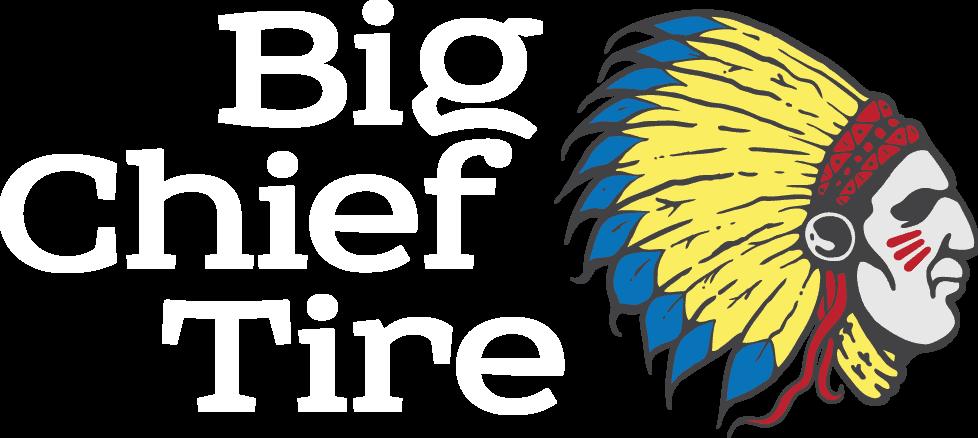DEVIL’S ADVOCATE

























Adviser: Larry Knight
Editor-in-Chief: Grace Larson
Managing Editor: Shravya Nalla
Layout and Design Editor: Amani Okero
Business Manager: Katya Sniriova
Digital Media Editor: Rowan Kershner
Assoc. Photography Editor: Garrett Lawrence
Assoc. Digital Media Editor: Katie Wong
Assoc. Business Manager: Jade Bateman
Assoc. Art Director: Amina Umar
Videographer: Arvind Mukund
Section Editor (Features): Lindsay Johnson
Section Editor (Arts & Ent.): Erica Truong
Section Editor (Opinions): Emily Zickuhr
Section Editor (Sports): Mena Alchi
Staff Writers: Heba Akhdar, Gabrielle Dosdos, Audrey Parman, Ramkumar Sridhar, Oscar Stone, Sriya Vemuri, Ashley Wang, Elle Wight
Staff Photographers: April Horn, Camille Knight
Contributing Advocates
The Devil’s Advocate is searching for contributing writers, photographers, artists, and flmmakers. Visit our Instagram @scpnewspaper or contact Editor-in-Chief Grace Larson at gracelar924@gmail.com to complete an application for the chance to be featured on our website or in a print issue.
Ads and Sponsorships
The Devil’s Advocate is dependent on our advertisers and our sponsors. When you purchase an ad with us, it reaches a diverse student population that can help your business. We can also design your ads. Our prices are: $45 (1/4 page), $70 (1/2 page), $125 (full page), $150 (back page). For an additional small fee, we can advertise your business digitally. Contact Business Manager Katya Sniriova at sniriovakatya@gmail.com or Adviser Mr. Larry Knight at knightl1@duvalschools.org.
Follow Us on Social Media
Twitter: @scpnewspaper
Instagram: @scpnewspaper
YouTube: Devil’s Advocate Newspaper
Facebook: Stanton Devil’s Advocate
Spotify: @scpnewspaper
Website: devilsadvocatepaper.com

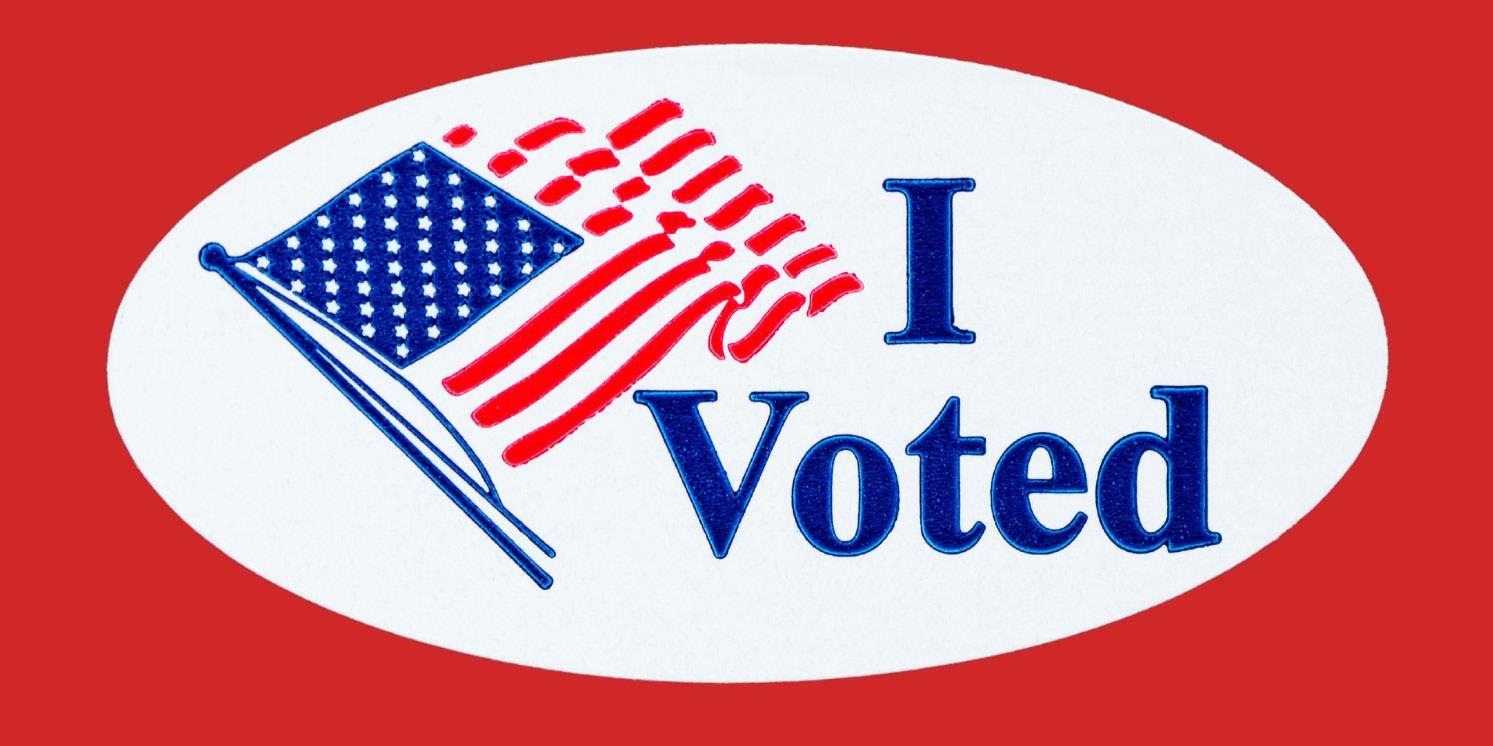
Voters adorn the “I Voted” sticker as a symbol for political participation.
The website needs updating. Luckily, Rookie knows just the person for the job.
By Sriya Vemuri
Propaganda plays an important role in the political landscape, infuencing public opinion in various ways.
By Audrey Parman
The 2024 Mock Election results are in, and with them come various opinions about this year’s presidential election.
13
PLAYING FOR CHANGE
By Elle Wight
Student and professional athletes alike leverage their infuence to support political candidates and voice their political views.
Nathaniel Miller
Through current and past presidential policies, Donald Trump paves the U.S forward by repairing the nation’s problems.

7
Oscar Stone
By Garrett Lawrence
Stanton students hold a variety of political beliefs, creating a diverse community.
DEBATE DYNAMICS
By Ashley Wang
Stanton students refne leadership, civic engagement, and etiquette to tackle global challenges through advocacy.
By
Gabrielle Dosdos
Having a lifetime of public service and qualifying attributes, Kamala Harris advocates for change to lead this country forward.
By Heba Akhdar
Although some voters often exclude third-party candidates from serious consideration, they can play a major role in elections, specifcally in the upcoming 2024 presidential race. STEIN
WHY THE ELECTION DOES NOT MATTER TO ME
By Adriana Chakarova
As the 2024 presidential race goes on, the election doesn’t hold trivial due to the lack of connection to youth.
Propaganda plays an important role in the political landscape, infuencing public opinion in various ways.
By SRIYA VEMURI, Staff Writer
iiiiiThroughout the course of American history, political propaganda has been used to infuence the opinions of voters. In political science, propaganda refers to any kind of messaging put out to beneft one’s side including political cartoons or social media posts. At Stanton College Preparatory School, current and future voters must cautiously navigate through propaganda to form their own opinions. It continues to be an evolving force, especially seen within the 2024 election season.
iiiii“Campaigns [started] using propaganda as early as elections even existed, “ said Sean Freeder, assistant professor of political science at the University of North Florida. “A lot of the same substance we see today is the same substance we saw back in the day.”
iiiiiTraditionally, propaganda was used in a variety of ways to shape public perception including political cartoons, pamphlets, speeches, and more. Dating back to the 1800s, it was used by rivaling parties to push their own agendas. Over time, the medium of propaganda has modernized. Even so, it still plays a large role in shaping public opinion.
iiiiiIn the 2024 general election, propaganda has been a ma or force of infuence on voters. Democratic and Republican party candidates Vice President Kamala Harris and former President Donald Trump have employed propaganda to spread their political agenda across different platforms. Today, social media has become a battleground for political messages. It is a place where candidates can push their own agendas and where students encounter propaganda.
iiiii I ve defnitely seen propaganda since this current election cycle has started, especially on social media,” said sophomore Sophia Venturello.
iiiiiOne particular type is transfer propaganda which is hen a fgure associates their brand ith a ell
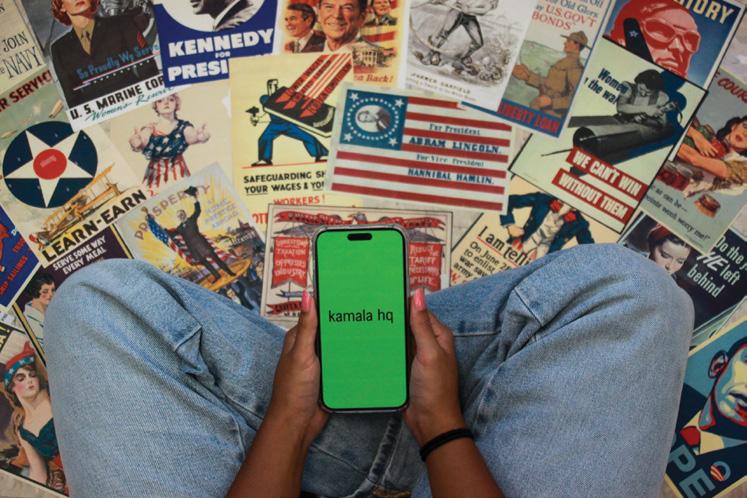
While propaganda has changed mediums, it continues to infuence the opinions of the people.
liked thing or idea to gain favor from its audience. During the recent campaign, Vice President Harris gained attention for using digital platforms to spread propaganda for her campaign. After pop star Charli XCX linked Harris with her “BRAT” album, Harris continued to push this connection to establish an online presence, even changing the background of
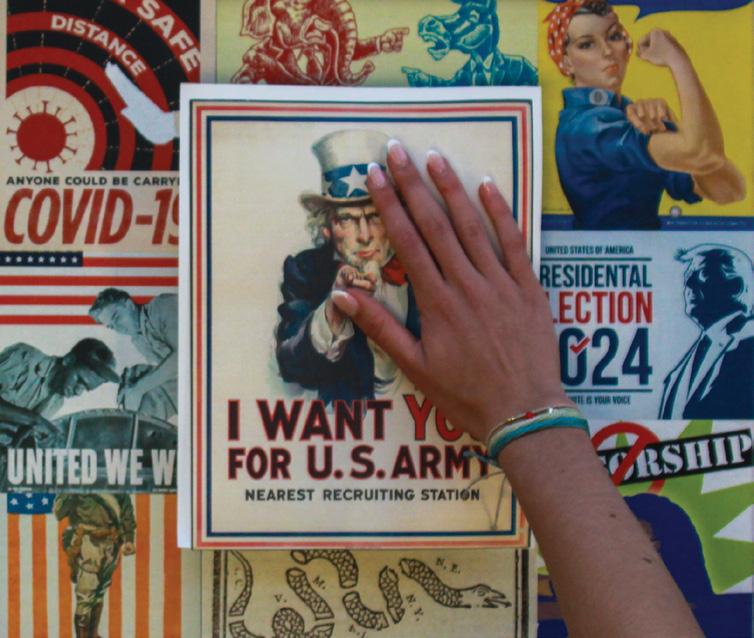
Propaganda is used to both push certain political agendas and bring attention to various issues.
her social media accounts including TikTok, X, and others to the green style of the album.
iiiiiHarris uses this iconography to appeal to younger audiences, taking advantage of the digital landscape to connect with them. While she takes on a range of unique campaign techniques, former President Trump has also employed his own methods involving infuencers on social media.
iiiiiAccording to USA Today, Trump has used podcast appearances as a form of propaganda. He has appeared in intervie s ith infuencers such as live streamer din oss and social media infuencer Logan Paul. These appearances aim to reach these creators’ audiences. Because of propaganda’s large presence online, it is important to cautiously navigate digital platforms. What some may assume is an ordinary post may just be propaganda.
iiiii“We’ve already seen [propaganda] used by both parties [in this election]. When you see a campaign message, you are seeing some form of propaganda,” said Freeder. “Now, [with] social media, the difference is that anyone can spread it.”
iiiiiAlthough using propaganda as a persuasive tool is not new, today’s digital era offers modern ways to spread political agendas. In the heat of the 2024 election season, political propaganda continues to emerge as a force uniting and dividing citizens.
Film allows governments and flmmakers to further their political agendas.
By OSCAR STONE, Staff Writer
iiiii ince the earliest days of cinema, flmmakers have used movies as a medium to express their ideas. While some cinematographers choose to convey lighthearted messages in their flm, others opt for more serious topics. A running theme throughout flm history has been the analysis of politics through a creative lens. For decades, governments and directors have used propaganda flms to spread political ideas to audiences.
iiiiiIn 1941, the United States military commandeered Disney Studios, and they commissioned the company into dedicating 90% of their effort into creating anti is propaganda. Under the American government, Disney created nearly flms, posters, and instructional videos for the military. Most of these were made for training, but a fe aimed to infuence the public. ne flm as er uehrer s ace, hich sho ed the absurdity of Nazi ideals and aimed to illustrate how great life in America was. This followed a precedent in propaganda for the ridicule of opposing ideas through visual and auditory media.
iiiiiNot only did the U.S. government use this medium, countless flmmakers have articulated their personal beliefs through their work, some in more obvious ways than others. In the 1980s, director ohn ilius e pressed his anti ommunist vie s through the popular flm, ed a n . his flm presented communist countries as enemies and the Americans as valiant heroes. Particularly targeted towards a younger audience, ed a n demonstrated ho certain flms can aim their agenda to ards specifc groups. iiiiiWhile it may go unnoticed by audiences, political propaganda is still prevalent in flms today. One issue which has frequently appeared in more recent flms concerns the environment. Popular movies such as “The Day After Tomorrow , , and vatar , all contain themes calling for environmental reform. Exclusively political issues also present themselves in modern flm. ivil ar is a feature flm hich harshly critici es the American political system, pointing out the dire consequences ideological division can cause.
iiiiiThe World War II era catalyzed the production of cinemagraphic propaganda, a practice which continues in current cinema. While the subtle inclusion of political ideas is tolerable, the inclusion of more blatant political statements may receive harsh criticism. Film as a medium is often used to call for action, and these themes tend to go unrecogni ed because of a flm s fctional plot or endearing story. Vie ing such flms can be en oyable, but ackno ledging the infuence they can have on the public allows people to be aware of the ideals being imposed upon them.

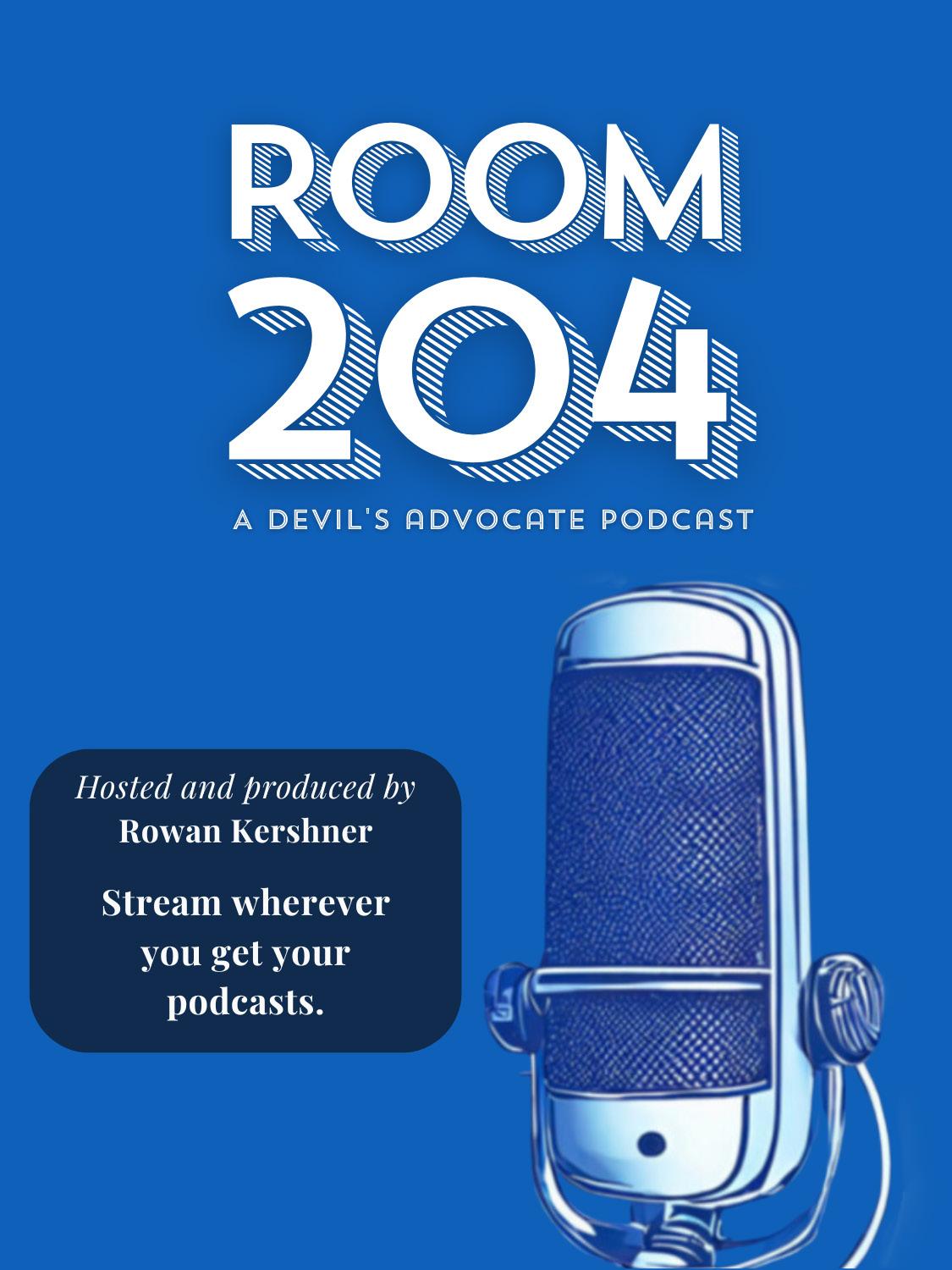
IB (International Baccalaureate) program is designed to provide academic training to help increase our students intellectual and personal development!
Earning the IB Diploma guarantees the Bright Futures scholarship
Advanced placement and course credit in many prestigious colleges and universities.
Look in the IB Teams page for more info on IB siblings!
Email: meladym@duvalschools org

By GARRETT LAWRENCE, Associate Photography Editor
Stanton students hold a variety of political beliefs, creating a diverse community.
ZAINAB FAROOQ, 10th

“I support the Democratic party because it leans towards the voice of the people like minorities on political issues.”








LUKE DEARING, 11th


“I am a Democrat because I believe that laws should be made based on common sense, not exclusively on public opinion.”

“I support the Republican party because the platform supports conservative values and promotes strong capitalist policies.”











“I believe that opinions should not be formed just based on media, they should be formed based on personal research.”









ALEC KENNEY, 12th ADITYA ABRAHAM THOMAS, 10th
“I am Independent because the major parties are drifting more extreme, whereas I have more centrist beliefs.”









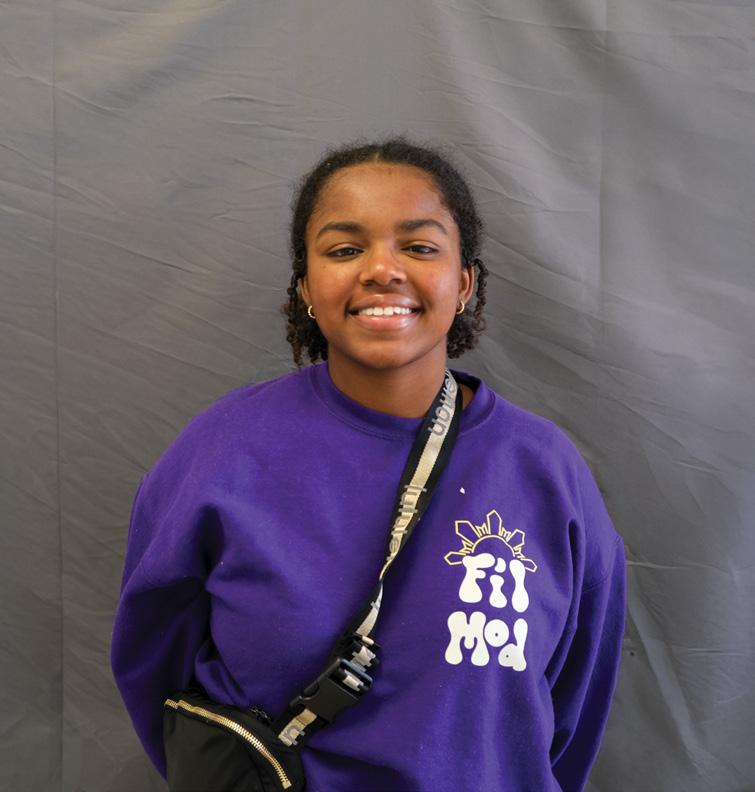
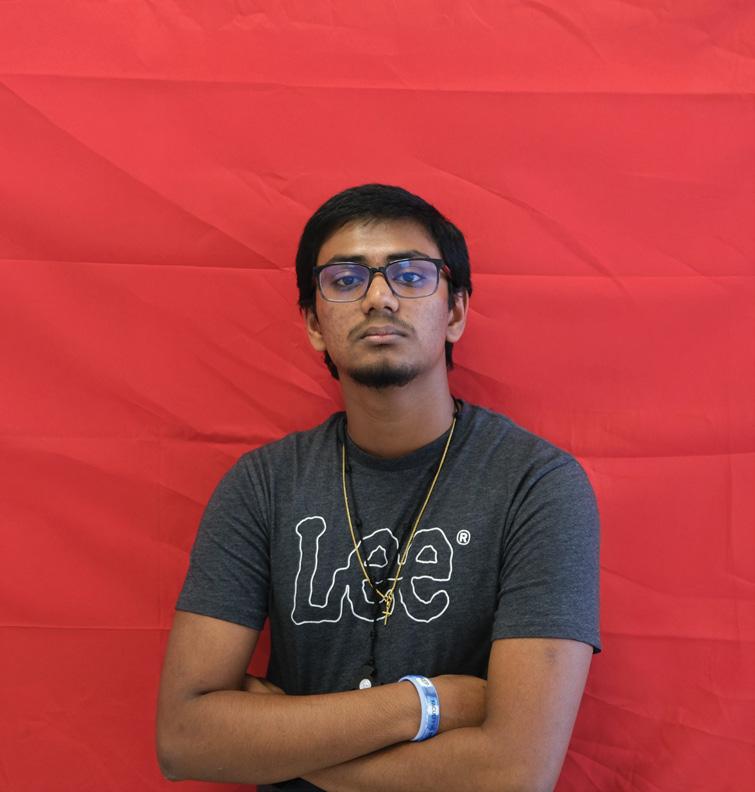
“I am a supporter of the Republican party because I believe that America should be made great again.”









JIMIA LOVE, 11th RAMSAGAR MENON, 11th
“I believe that people should vote based on their beliefs and values, not strictly candidates or parties.”


















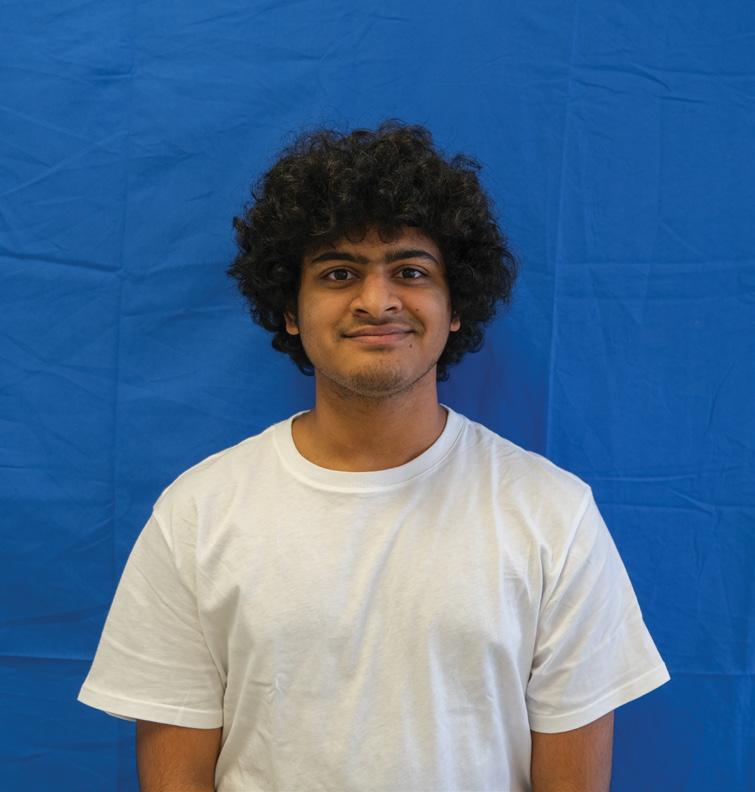
“I am a Democrat because I believe that a stronger central government historically performs better than the opposite.”
















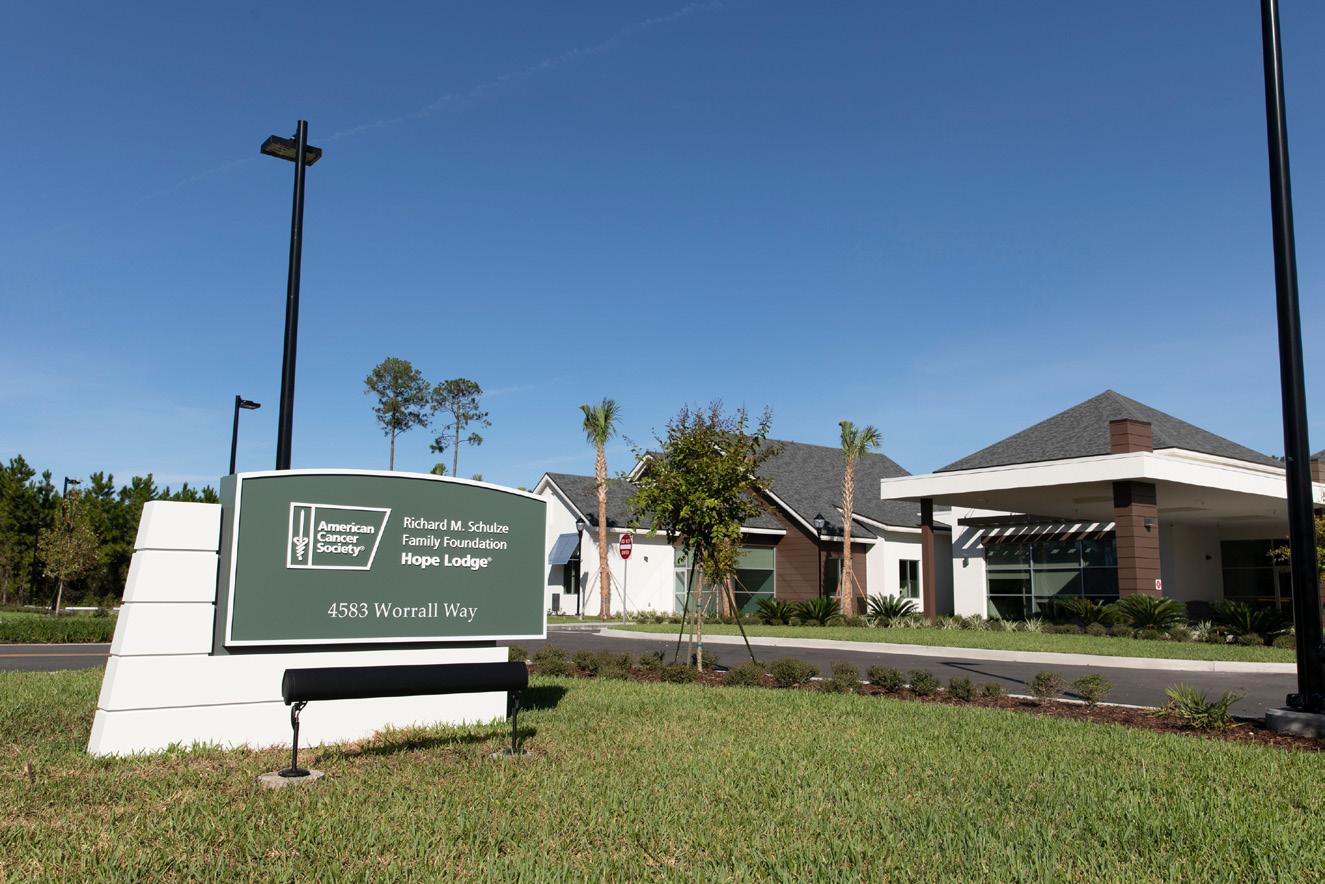








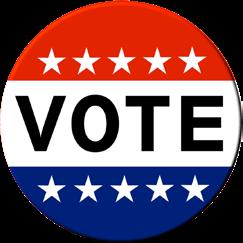





The 2024 Mock Election results are in, and with them come various opinions about this year’s presidential election.
By AUDREY PARMAN, Staf Writer





Students at Stanton College Preparatory School are exploring their own political opinions, even if the majority are unable to vote in the 2024 presidential election. As it has since 2000, the quadrennial Stanton Mock Election serves to include young people in politics. According to this year’s Mock Election results, the most common opinion amongst students and faculty is that Vice President Kamala Harris should be the 47th president of the United States.
Out of the 1,271 students enrolled, 732 participated. Of these participants, 61.5% voted for Democratic Vice President Harris while 30.1% voted for Republican former President Donald Trump. Jill Stein of the Green Party received 4.0% of the votes and Cornel West, who ran independently, had 4.2%. The junior class had the highest participation with 195 voters. A total 56 of 95 faculty members also participated, 85.7% voting for Harris, 8.9% for Trump, 1.7% for Stein and 3.6% for West. Of the teacher departments, History had the highest participation.
To collect these votes, students and faculty completed a ballot via a Microsoft Form posted to the Student Activities Ofce Microsoft Teams page on Sept. 24. In addition to choosing their candidate, students selected their grade, ethnicity, sex and whether they were enrolled as an International Baccalaureate or Advanced Placement/Honors student. The faculty chose their ethnicity, sex, role, department, and whether they would vote in the upcoming election.
Using Forms to submit votes is a newer method, only having begun in 2020. The Mock Election had previously been conducted in person, with paper slips and ballot boxes for each class. With Forms, the votes were counted much faster. Despite changes to this process, Stanton’s mock elections have always refected the winner of the national election’s popular vote, and this trend could continue if Harris wins the popular vote.
Another trend shows the number of voters in the Mock Election has increased since 2012. In each election year, it is inevitable that some students do not vote, while others are excited for the opportunity. A common reason for students’ lack of participation was not being added to the Teams channel with the Form. Factors in their control, however, included their own opinions on voting, such as the perceived responsibility to get who they view as the best candidate elected.
“If you have the choice to vote [but] do not, and are upset with the outcome, it is your fault for not voting,” said freshman Jude Ochoa.
Another motivation for their participation is often passion regarding political topics. Despite the fact that most Mock Election student participants cannot vote, these political topics are areas of concern for those who want a president with similar beliefs. Many voters noted an issue in particular that they were concerned with.
“As a female, I feel better protected under Harris but there are policies each [candidate has] that make sense,” said sophomore Ashlynne Deason.
According to their respective campaign websites, Harris strongly supports women’s reproductive rights, whereas Trump opposes late-term abortion. Harris’ stance appeals to most Mock Election voters, and several were interested in reproductive rights. However, other concerns took precedent for some.
“When Trump was president, there was a lot more economic stability,” said sophomore David Broydo.
According to Broydo, his primary concern was the economy. Although many, like him, cast their vote to support a particular candidate, others were driven by distaste. While each candidate has their dissenters, some were passionate enough to vote out of spite.
“I voted for Harris,” said freshman Saanvi Arutla. “Trump is a felon, and he was also accused of sexual assault.”
As Artula stated, Trump faced six trials for various criminal charges beginning in April 2024, according to C-SPAN. He was indicted on 88 charges and found guilty of 34 felonies. However, his policies are still appealing to many, especially those concerning the economy, as Broydo mentioned. In contrast, some fnd Harris’ economic policies less attractive.
“[Harris] sent billions of dollars to foreign countries to help them in their battles while we should be focusing on America frst,” said junior Fortune Emmanuel.
Per the Associated Press, the Biden Administration, under which Harris was vice president, approved of spending $95 billion in foreign aid in April 2024. Trump openly expressed disapproval of this foreign aid package, like Harris’ dissenters.
These opinions, however, only cover a portion of the motivations for voters to support a certain candidate. The goal of the Mock Election is and has been to display some of the diverse political views of Stanton: a microcosm of the U.S. Until the country’s votes are counted, the Mock Election’s accuracy in relation to this year’s presidential election remains unknown.





























Of male voters...

Of female voters...

46% voted for Donald Trump.
43% voted for Kamala Harris.
17% voted for Donald Trump.
78% voted for Kamala Harris.
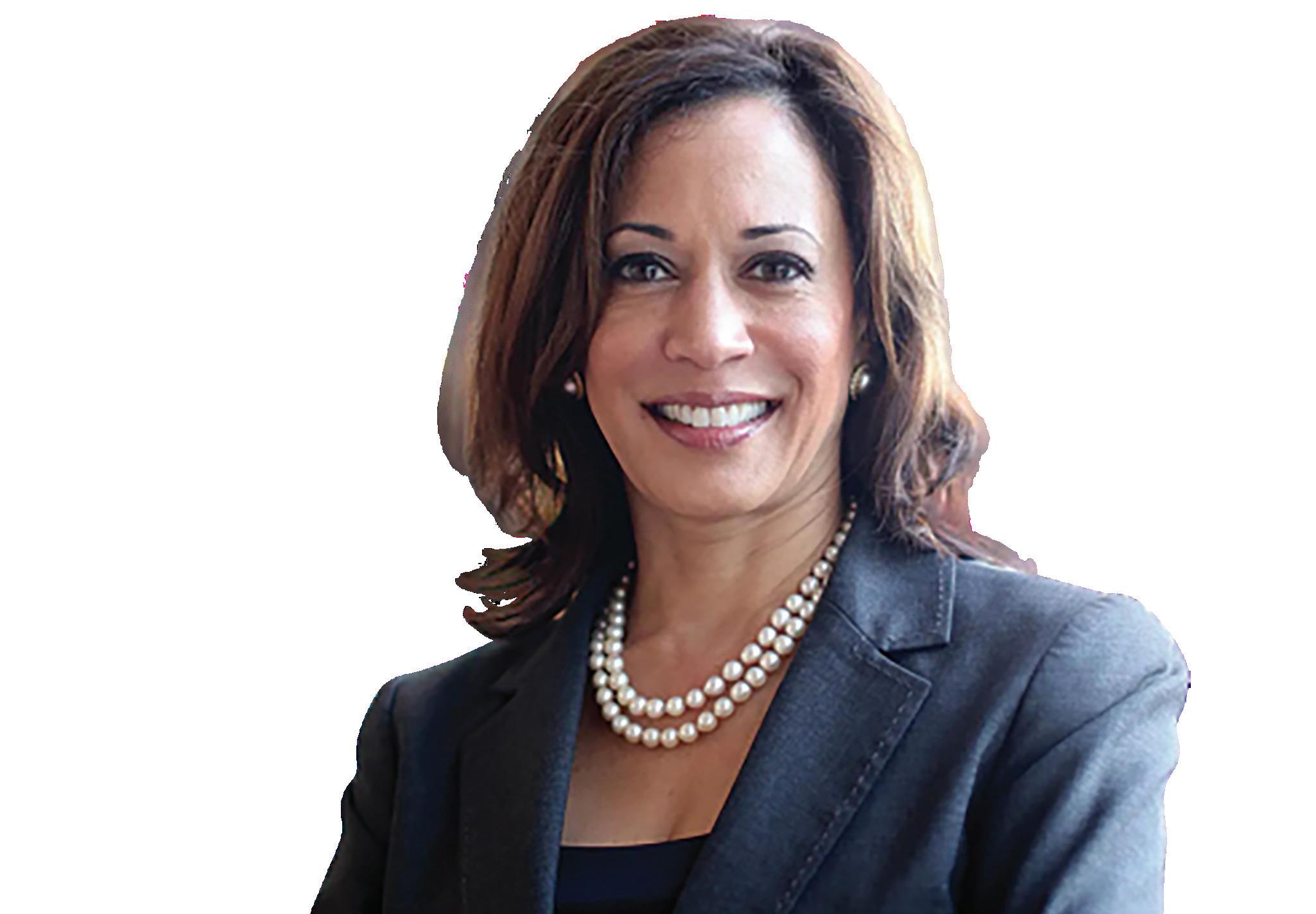










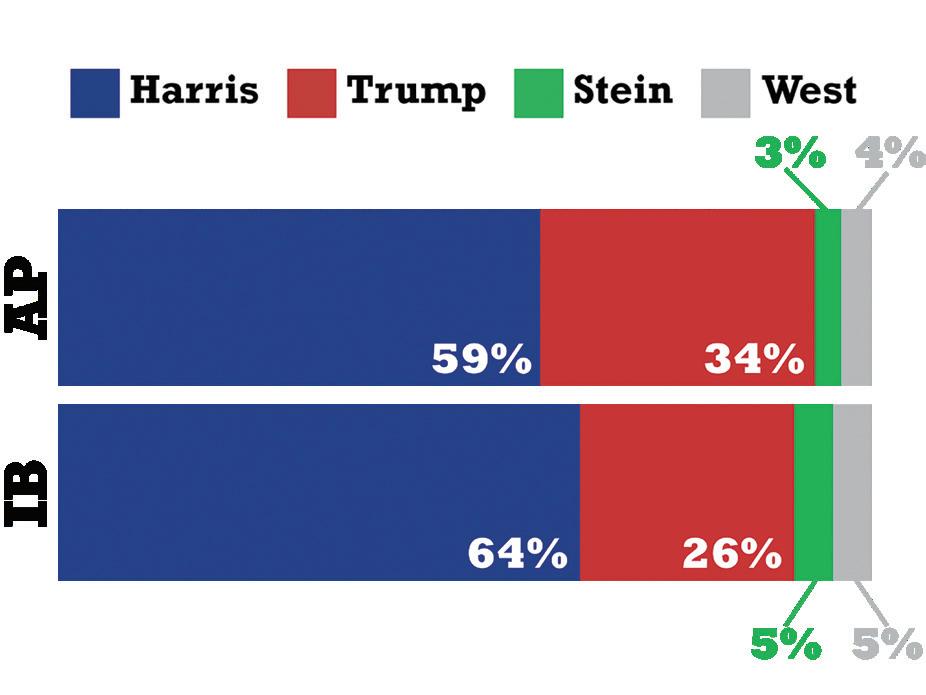
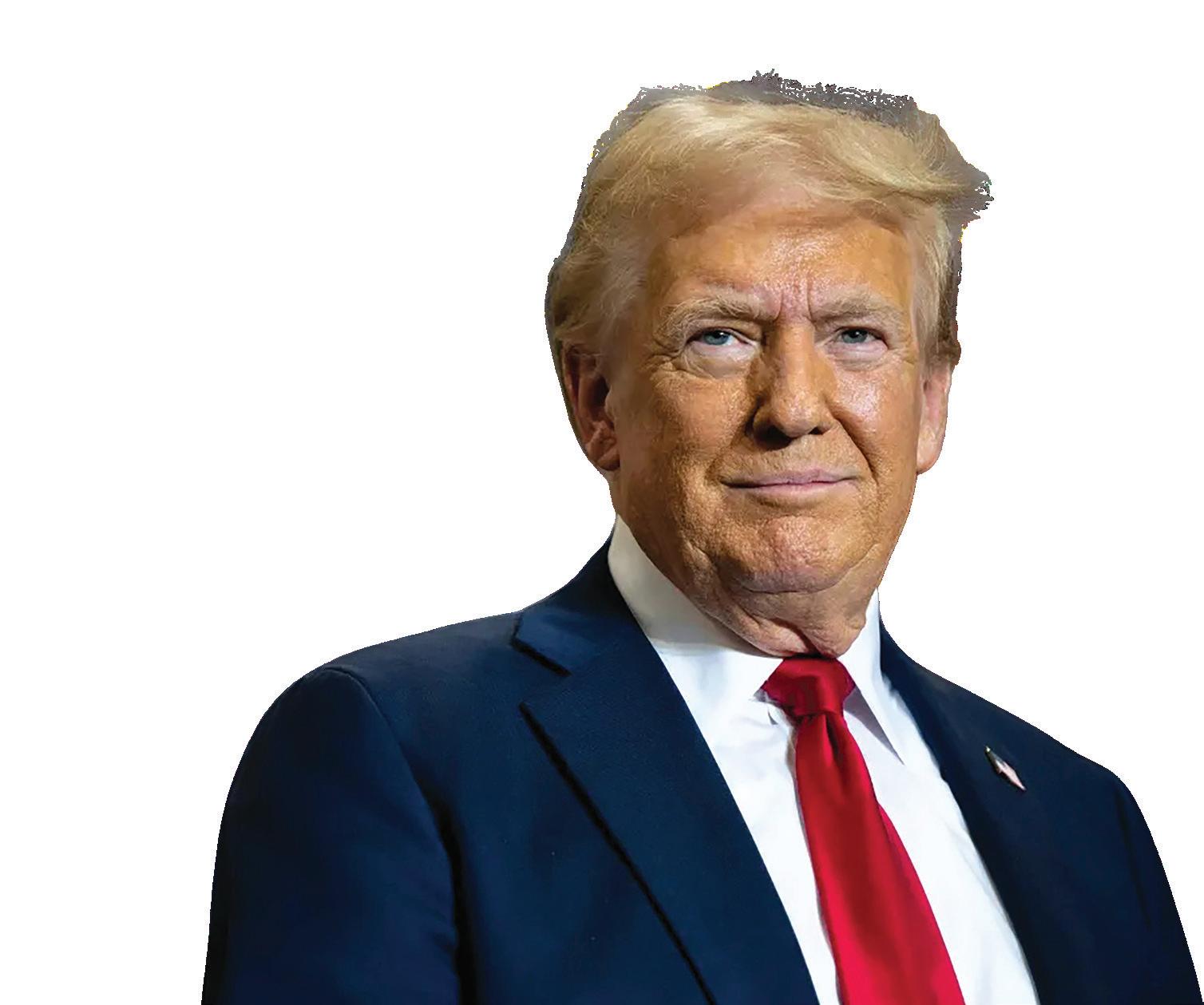




61.5% voted for Harris



voted for Stein 4.0%



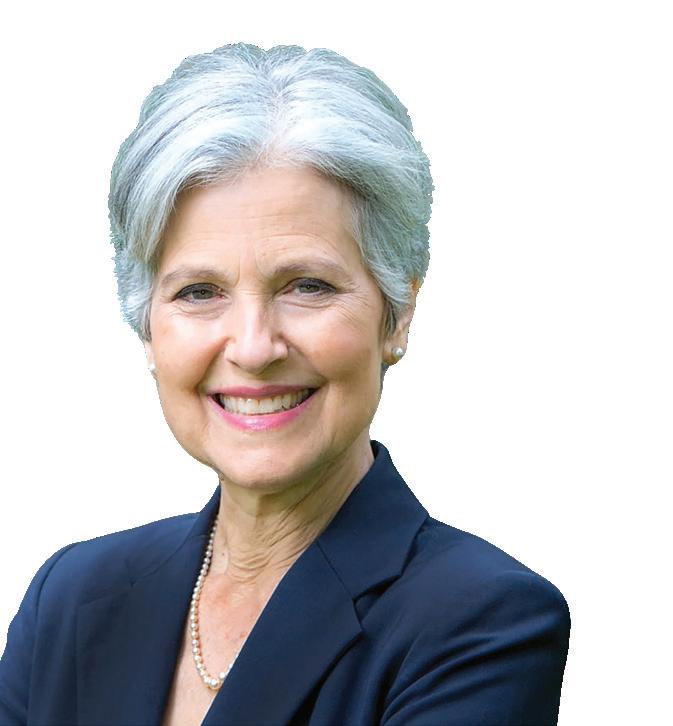






















































30.1% voted for Trump



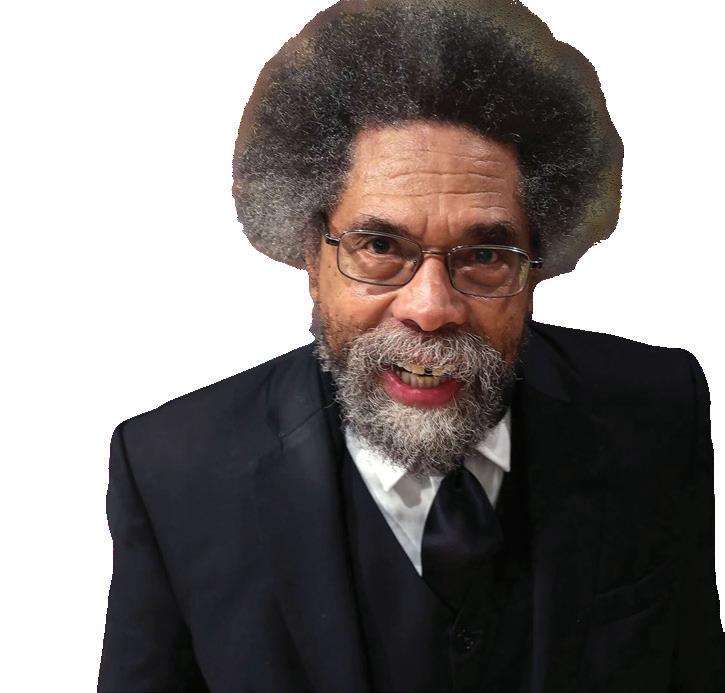











Voting by Class

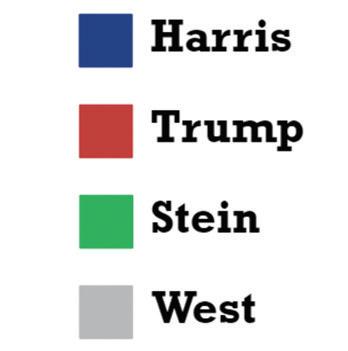
Faculty Votes
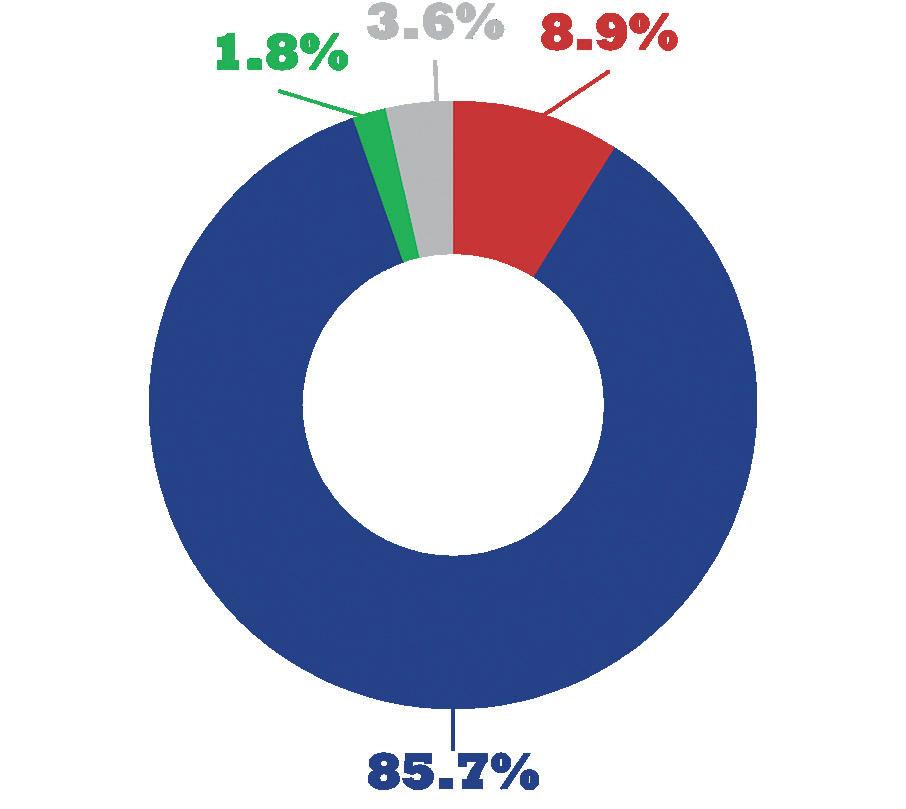
For more Mock Election results, visit our website: voted for West 4.2%


tanton ollege reparatory chool students refne leadership, civil engagement, and eti uette to tackle global challenges through thoughtful advocacy.
By ASHLEY WANG, Staff Writer
At Stanton College Preparatory School, students are encouraged to become globally aware and civically engaged citizens, a mission deeply embedded in the school’s culture. These young soon-to-be voters navigate through nuanced perspectives, empowering them to become more involved, aware, and cohesive. This vision evolves through clubs like Mock Trial or Youth in Government, which play pivotal roles in fostering advocacy.
“Advocacy is about understanding that we are all parts of a much larger whole,” said Mr. Steven Ingram, Ethics Bowl and Law Club sponsor. “These clubs are opportunities not only for the school but for the individuals who participate.”
From Model United Nations to Ethics Bowl to Law Club, Stanton’s civic engagement clubs aim to develop essential skills such as critical thinking and effective communication for political action. In Ethics Bowl, for instance, students confront ethical cases and develop an opinion through teamwork and public speaking skills to create a logical and organized argument. These organizations equip students with the knowledge and skills necessary to contribute positively to their communities. Through their involvement, students learn that being informed and active participants in civic life fosters a more just and equitable society.
“During competition[s], we [must] be quick [in responding],” said senior Alan Tang, co-president of Law Club. “We [must] argue and communicate our case coherently. These skills are important for hatever feld e choose in the future.
These skills encourage students to engage in
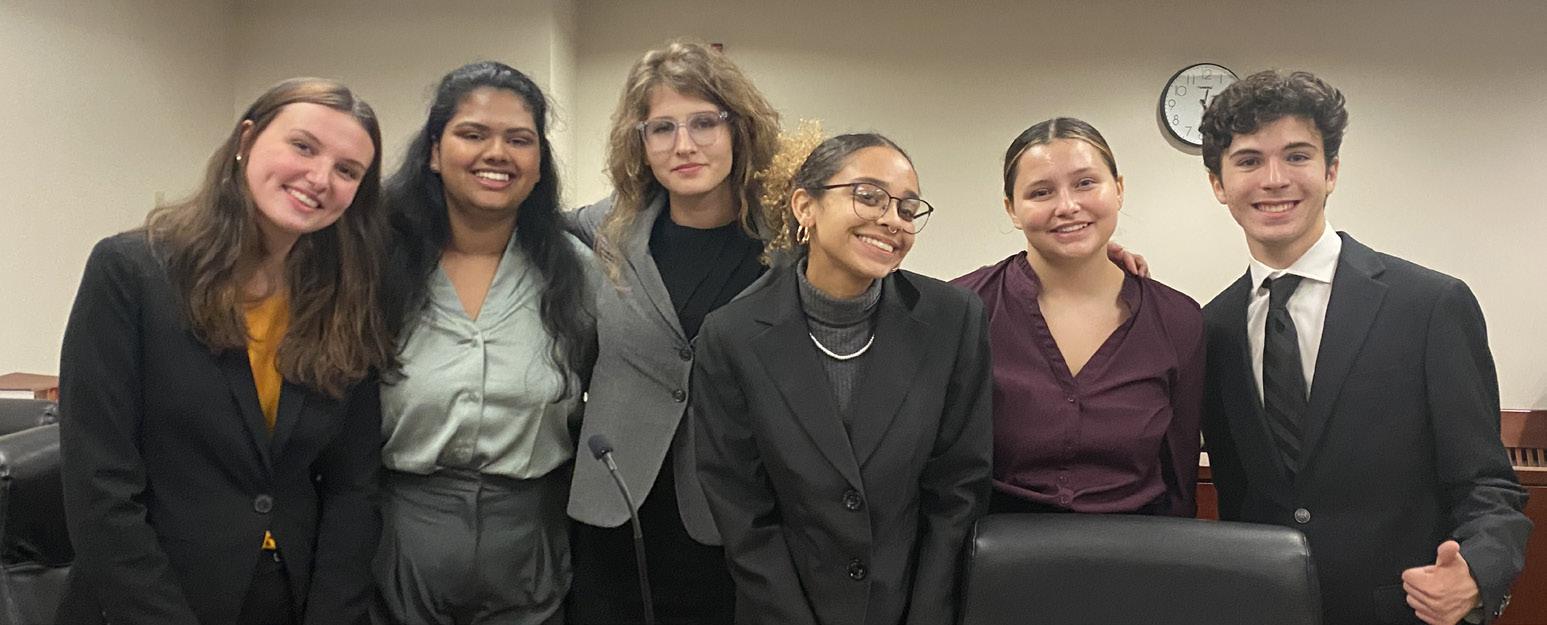
outside political debates, where advocacy is pivotal in providing opportunities to infuence policy or shape societal trends. In recent years, however, some U.S. presidential debates have devolved from traditional discussions into entertainment-focused spectacles. As a result, the 2024 presidential debates necessitated the introduction of fve ne rules, including muted microphones, addressing concerns about the tone and conduct of the debate.
“Model UN helps us understand what is happening in the world,” said senior Bela Perre, treasurer of Model UN. “Not only in the United States but globally [as we recognize] different

After school, Law Club students meet to engage in debates on a range of subjects, sharpening their skills.
issues in different places.”
While some express opinions without considering opposing viewpoints, political organizations teach students to slow down and listen. The goal is not just to argue but to understand, collaborate, and seek solutions that beneft the community. his practice of receptiveness provides students with the essential skills for effective activism, ensuring they approach causes with thoughtful consideration and informed strategies.
Individuals often use social media to inform themselves about real-world politics. The development of social media has created a new norm through its widespread usage, where political fgures often employ tactics to outsmart their opposition. These debates resemble performances rather than exchanges of ideas, with candidates focusing on “winning” through clever retorts or taunts to undermine the other side.
“At a young age, you [are] involved in social media,” said Arnav Khanolkar, sophomore Model UN delegate . “[As] you grow and develop, you to become a better leader and well-informed [citizen].”
For students involved in advocacy and debate, social media presents both a challenge and an opportunity. They must adapt to new political cultures and embrace different social issues, as they represent their generation and future. By learning to slow down, fact-check, and engage with opposing viewpoints, students can rise above and become advocates for meaningful change.
u en an pro essional a le es ali e leverage eir infuence o suppor poli ical can i a es an voice eir poli ical views.
By ELLE WIGHT, Staff Writer
Sports serve as a powerful form of expression for countless athletes. Whether through fast times, impressive plays, or breathtaking shots, athletes can effortlessly capture the crowd’s attention. With the upcoming 2024 presidential election, various professional athletes are urging fans to vote, using their platforms to endorse candidates and share their political perspectives. Similarly, athletes at tanton ollege reparatory chool are infuencing society by voicing their political opinions. Both professional and student athletes are advocating politically, whether by endorsing candidates or encouraging others to vote.
While both professional and student athletes advocate politically, professional athletes have larger fan bases, giving them signifcant infuence when advocating. Several athletes have taken positions for the 2024 presidential election, including NBA Hall of Famer Magic Johnson and NBA All-Star Stephen Curry, both of whom endorsed Vice President Kamala Harris.
“It was [a great honor] to represent Team USA and win that gold medal at the Olympics this summer,” said Curry at the Democratic National Convention on Aug. 22, 2024. “That unity on and off the court reminded us that we can do all things and continue to inspire the world [together]. Kamala as president could bring [back] that unity and continue to move our country forward.”
Likewise, former heavyweight boxing champion Mike Tyson and former professional wrestler Hulk Hogan, both Hall of Famers, recently endorsed former President Donald Trump. Despite differing political views, athletes from both parties strive to shape the election.
“I see [Trump and JD Vance as] the greatest tag team getting ready to straighten this country out,” said Hogan at the Republican National Convention on July 18, 2024.
Countless prominent athletes, like Curry and Hogan, serve as role models for young athletes. hese professionals can infuence the decisions of younger generations and foster a sense of civic duty. This is evident at high schools including Stanton, where student-athletes are voting for the frst time in the presidential election. ome seek endorsements from respected professional athletes to affect their vote.
“Athletes such as Steph Curry and Lebron ames greatly infuence me the most, said senior basketball player Karthik Aka. “Athletes [who] promote their political beliefs foster a sense of civic duty because [it] makes me want to vote and put my voice out there.”
Athletes engage with younger voters like Aka through various social media platforms, including Instagram and X. These platforms enable athletes
to e press their opinions and confrm candidates, targeting the youth active on social media.
“Social media plays a major role in athlete activism because it is a main forum for sharing [opinions],” said Aka. “Athletes get their voices out to a large number of people [on social media], encouraging [others] to follow their ideas.”
Recently, Trump appeared on WWE wrestler and YouTuber Logan Paul’s podcast, “Impaulsive.” On June 13, 2024, Paul urged his viewers, many of whom are young voters, to support Trump. Similarly, Olympic rugby bronze medalist and Instagram infuencer Ilona aher endorsed arris, e pressing excitement for greater female representation. Athletes encourage younger generations to vote via these platforms by producing diverse political content.
Despite the positive impact of these endorsements, there is ongoing controversy about whether professional athletes should use their platforms to raise awareness for political candidates. Many believe athletes have a responsibility to advocate politically.
“Since sports are not [primarily] viewed as political, athletes [can] reach a broader audience and motivate people to vote, which is fundamental to shape a society that supports all individuals,” said senior soccer player Yuuki Wiesner.
Additionally, a few people feel professional athletes not only have a political responsibility to advocate, but also produce effective political content. They can shape the opinions of numerous people, especially their supporters.
“Professional athletes have a [considerable amount] of political power because their opinions can be mirrored by their fans,” said senior soccer player Anthony Hernandez.
Despite numerous athletes producing effective endorsements, others believe professional athletes should focus solely on sports and refrain from sharing their political views. Though athletes can signifcantly s ay political perspectives, this may not al ays be benefcial.
“Professional athletes should not use their platforms to endorse candidates because what they say about them can infuence fans to vote the same way, [instead of voting based on] what they think is best for the future of our country,” said senior wrestler Mackenzie Mock.
Regardless of varying opinions, professional athletes continue to utilize their platforms to endorse candidates and share their political perspectives. hether vie ed as benefcial or unnecessary during the 2024 presidential election, both professional and student athletes continue to advocate their opinions and showcase their infuence beyond the playing feld.
Debate continues over whether professional and student athletes have a responsibility to voice their political beliefs.
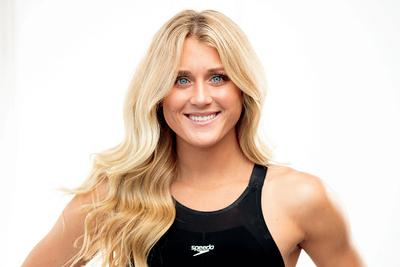
“I am voting for [President] Donald J. Trump because I am a woman ”
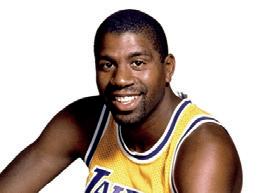
will be a president for all people, no matter the race, language, or party line ”
“Using their platform without defined reasoning is irresponsible.”
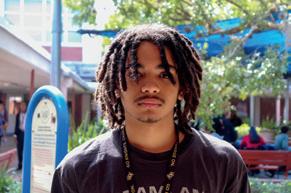

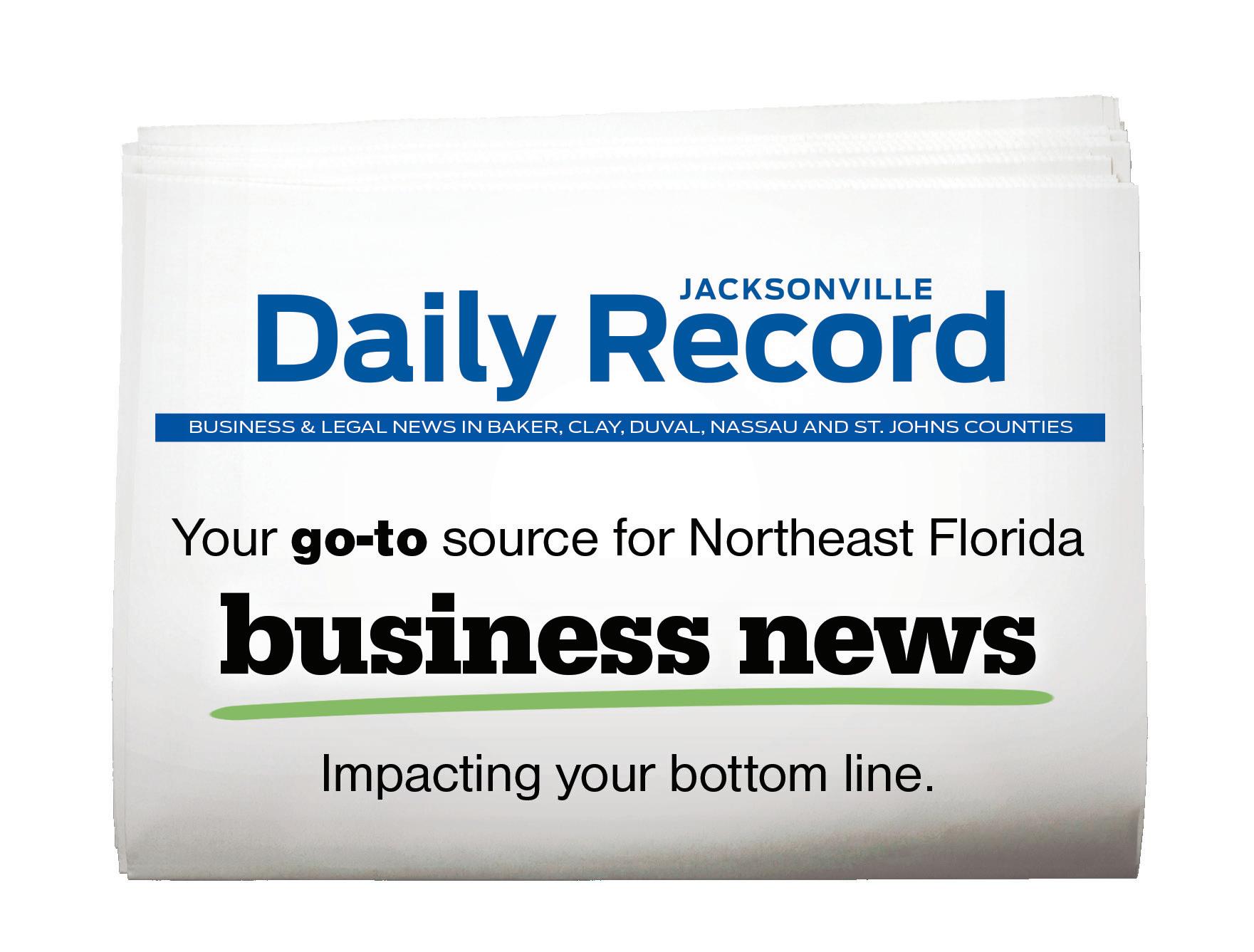
Est. 1983 I Stanton College Preparatory School
2024-2025
Grace Larson
Shravya Nalla
Amani Okero
Katya Sniriova Rowan Kershner
Editor-in-Chief
Managing Editor
Layout and Design Editor
Business Manager
Digital Media Editor
iiiiiDevil’s Advocate serves as the ofcial newspaper of Stanton College Preparatory School. It is produced quarterly by members of the Journalism class. The editors reserve the right to edit any material submitted into the paper for content, grammar, length and accuracy.
iiiiiDevil’s Advocate is a public forum for student expression, which encourages free exchanges of opinions concerning controversial and noncontroversial community and school related issues. The advertisements and ideas expressed within the newspaper are not necessarily those of the newspaper staf, Stanton administration, or the Duval County Public School Board.
iiiiiDevil’s Advocate accepts advertisements from all businesses in the Stanton community. The ad contract can be given to a staf member or newspaper adviser Mr. Larry Knight.
iiiiiReaders may contact any staf member or the adviser at (904) 630-6760 or at knightl1@duvalschools.org.
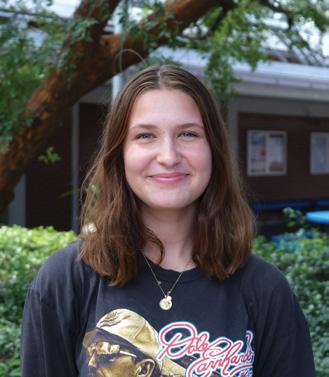
photo by Garrett Lawrence
iiiiiIn recent years, increasing tensions between the two main political parties has worsened the United States’ political climate. This strong division, which dates back to the nation’s founding, has created an ever growing rift in political dynamics. This has left some feeling apprehensive and unwilling to share their political views with those around them.
iiiiiIn this issue, Devil’s Advocate staf members attempt to challenge this norm by analyzing various political afairs and perspectives. By granting teenagers an opportunity to speak out regarding politics, this issue contributes to the growing trend of political activism among youth. This shift is evident in the number of students that voted in our seventh quadrennial mock election, a demographic explored by staf writer Audrey Parman in the Features story titled “2024 Mock Election.” With just 30% of students voting in the 2020 mock election, this year the votes nearly doubled with 58% of students participating.
iiiiiThis increased voter turnout could be attributed to a variety of factors, some of which we explore throughout this issue. Political endorsements, propaganda, and content geared towards teenagers may have all contributed to this rise in number. Regardless, it is becoming increasingly evident that the youth are immersing themselves in the political atmosphere and are here to stay.
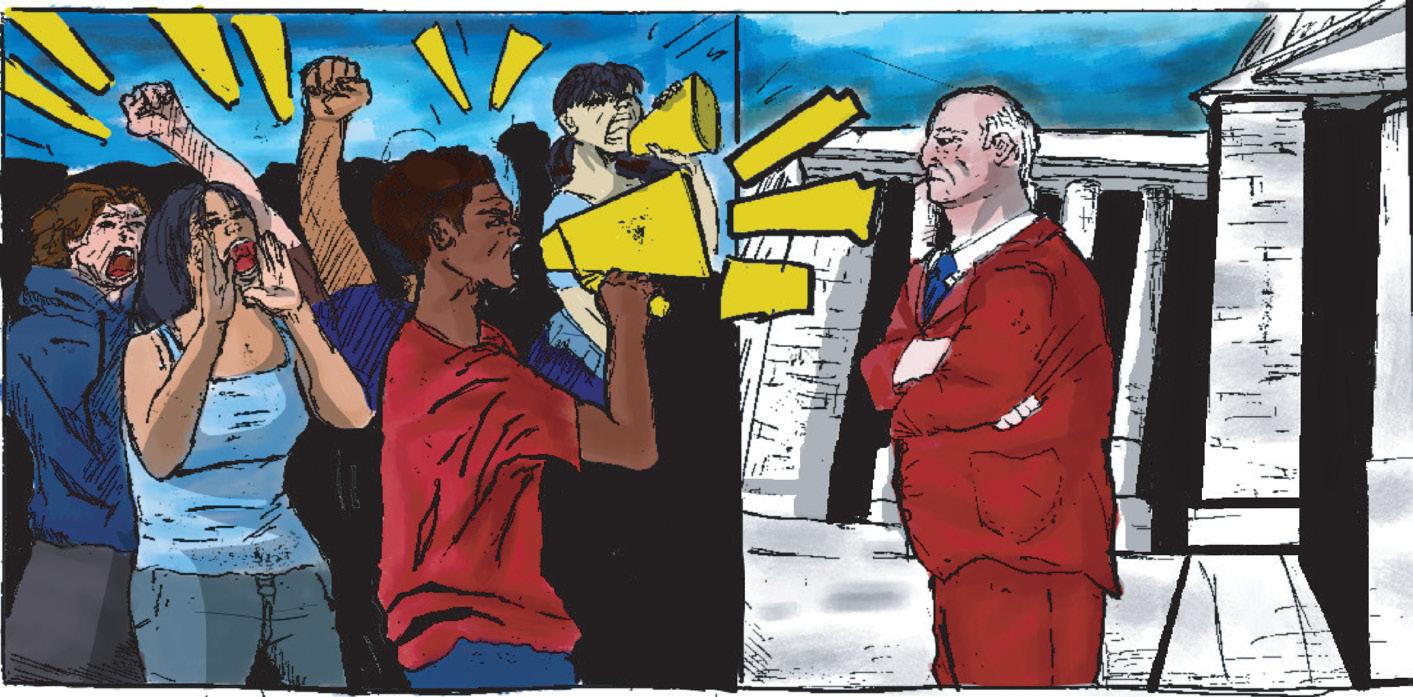
By THE EDITORIAL BOARD
iiiiiWith the 2024 presidential elections approaching, voters are again faced with the decision of who to cast their ballots for. While some experienced voters have established a strategy in picking their candidate, new voters are faced with the challenge of developing their own political knowledge before solidifying any decisions. At Stanton College Preparatory School, some seniors have discovered the weight of their newfound role as frst time voters in this year’s election. While the remainder of the student body will not assume this responsibility until coming years, it is still important to be politically educated. Students looking to become more politically active should consider the widespread efects of their decisions. These choices infuence all students, even those who cannot vote, stressing the value of gaining political knowledge.
iiiiiStudents in Florida have felt the direct efects of Gov. Ron DeSantis’ policies with a law passed in May 2023, titled “House Bill 379.” The bill states students of all grades can no longer use their cell phones during school hours unless explicitly permitted by a teacher. According to the Florida Senate website, HB 379 was fled in January 2023 and was signed by the governor in May 2023, subsequently taking efect on July 1. Taking only four months to process, Florida became the frst state to legally ban cellphones within the classroom.
iiiiiAccording to Florida Politics, the measure’s sponsor, Republican Rep. Brad Yeager, advocated the bill takes the frst steps to creating a more focused school environment for students. Yeager referenced various studies in support of his conclusion, such as a 2018 Pew Research Center article which reported 67% of teenagers who are constantly online have been cyberbullied. However, a contrasting study conducted by Harvard Graduate School of Education concluded cellphone bans ignore equity, as low-income students often have mobile-only access to the internet; both of these studies present
results that impact all students. Scientifc studies present difering perspectives on the efects of in-school phone usage. Similarly, the public opinion is divided on the bill’s productivity, with some arguing it creates limitations to students’ freedom in school. iiiiiWith varying reactions to the bill, students are now tasked with going beyond the ballot box to express their thoughts regarding certain policies. The widespread discourse has resulted in students using digital platforms to advocate for their beliefs. These interactions force people to become active patrons in their community, just as within the arena of politics. iiiiiInstead of solely seeking change through voting, student activism also promotes direct involvement, such as protests or walkouts. According to News4Jax, in April 2023, 300 schools and universities across Florida, staged walkouts to protest Gov. DeSantis’ decision to defund diversity, equity, and inclusion programs. In January 2024, according to NBC News, this measure was the catalyst for the Florida Board of Governors to prohibit funding for DEI programs in public universities, leading to the closure of the University of North Florida’s Ofce of Diversity and Inclusion and LGBTQ campus center. In light of this decision, Univeristy of North Florida students expressed their disagreement by actively protesting. Within both cases, young adults advocated for the recognition of their beliefs on a larger political scale.
iiiiiThe act of protesting would, however, not be possible without informed individuals seeking to make a diference. From the local laws infuencing education reforms to national policies, students should be educated on the political topics that infuence their livelihoods. The same is applicable to voting, as it is vital to be aware of candidates’ goals and values, both having a signifcant impact on surrounding communities. Without educated voters, political decisions and policies would fail to refect the perspective of its citizens.

“I think gun control is important because if managed poorly it can lead to safety hazards like school and mass shootings.”

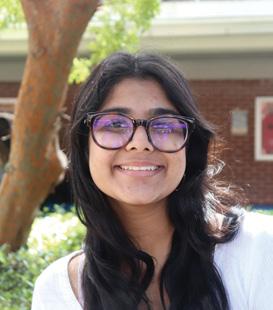
“As a female, its important that women have the right to do what they want with their bodies and not be forced into having the child.”
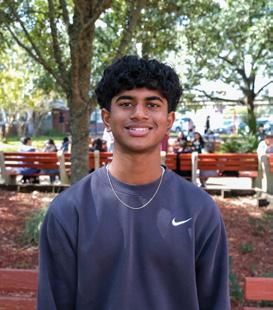
“I feel like the most important issue is climate change. I think it is because in the future it will become a really big issue.”
*According to a survey of 196 Stanton students

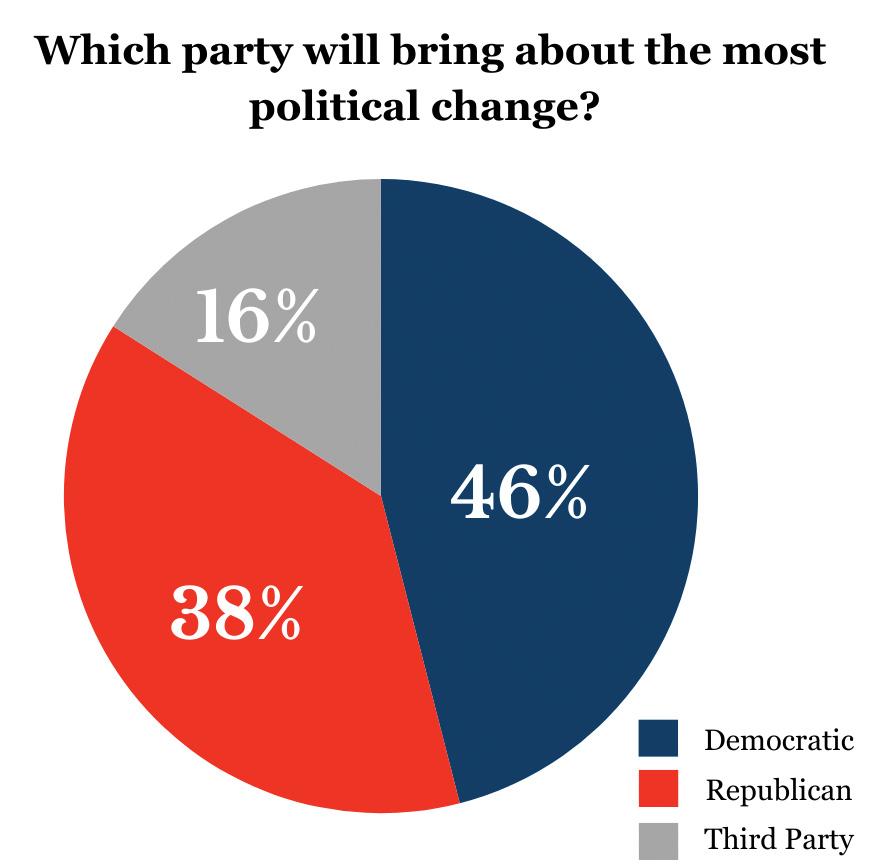
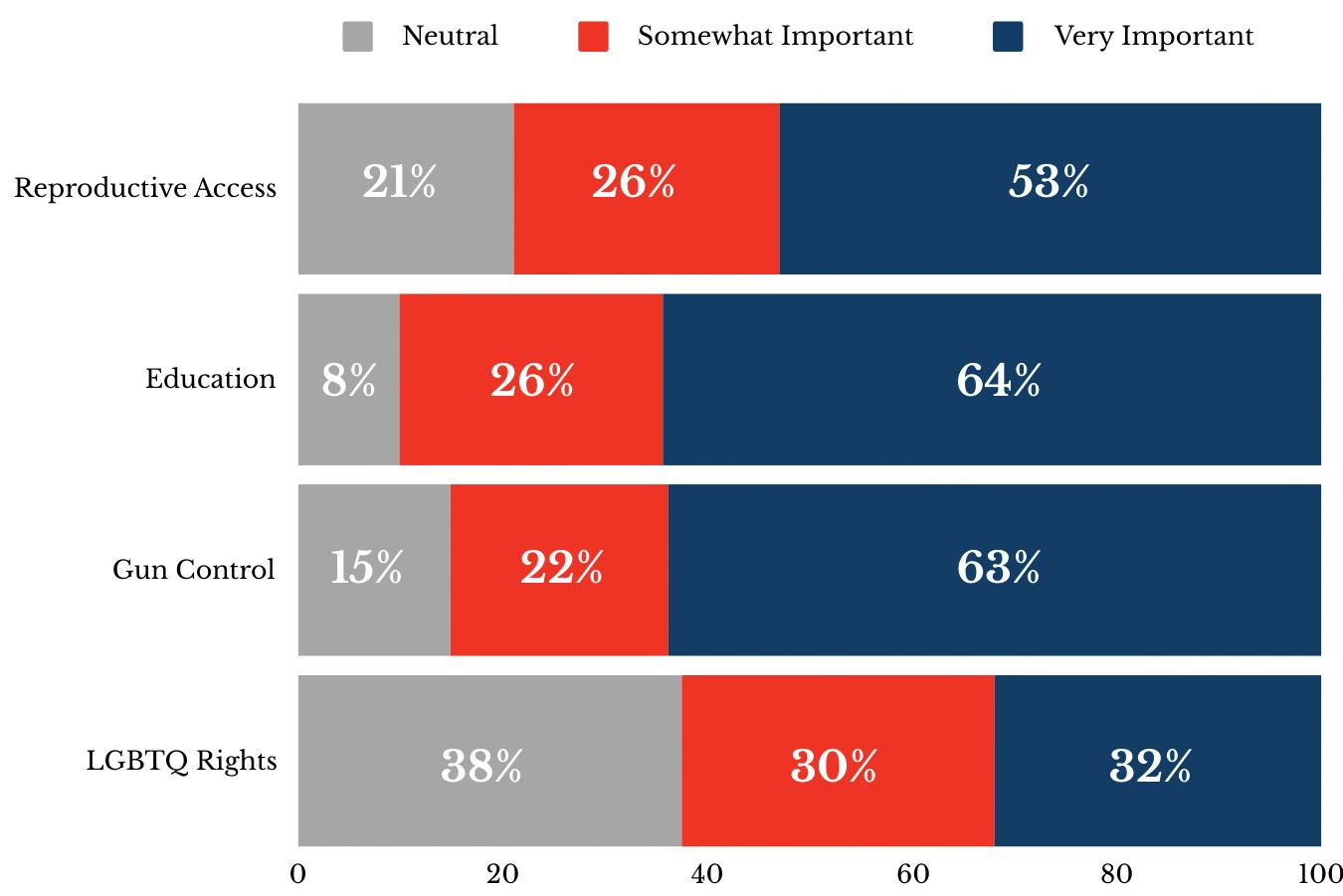
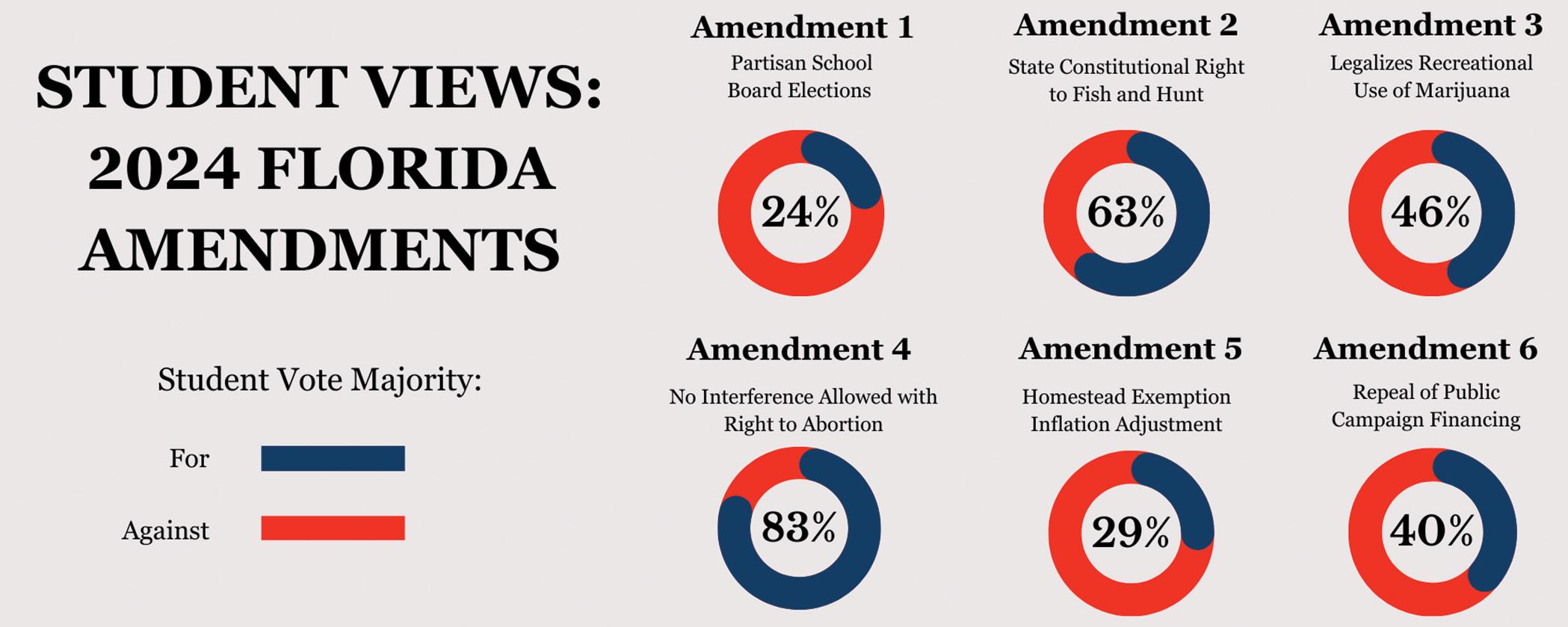
*According to a survey of 196
By NATHANIEL MILLER, Contributing Writer

Economy drives a nation to greatness. Under the Biden Administration, the economy has sufered greatly. Americans are paying more for things that used to cost less. Infation is high, and a large percentage of workers feel like they’re living paycheck to paycheck. Donald Trump is the best candidate for president because he will improve our economy and fx our border.
While in ofce, Donald Trump’s economic policies were benefcial to small businesses. Ten days after taking ofce, he signed the “Two-for-One” rule, an executive order requiring federal agencies to eliminate two regulations for every one issued, trying to unburden small businesses. When small businesses are unburdened, they function better, which benefts the economy. Later in 2017, the Tax Cuts and Jobs Act was passed, which lowered the corporate tax rate to 21% and included provisions for pass-through businesses to receive a 20% deduction on qualifed income. Under this act, unemployment was the lowest in 50 years. If Trump is elected, think of what his administration could do with their experience in successful economics.
More on successes, the border crisis is an integral part of his campaign. For example, Trump has promised a mass deportation of illegal immigrants. While this sounds shocking at frst, it is important to note that not every person crossing the border is wellmeaning. Many are part of human trafcking and drug rings, which is not good for the United States. Under the Trump Administration, the southern border was incredibly secure. According to the Department of Homeland Security, in all sectors where there is a border wall, there has been a reduction in illegal crossings and smuggling activities. In the Yuma, Arizona, Sector, for example, Customs and Border Protection saw a 79% decrease in apprehensions since the border wall was implemented. And then there are those brought illegally as children with no prior knowledge, Dreamers. Regarding Dreamers, Trump put an ofer to Congress to provide 25 billion to fund the border wall with Mexico in January 2018. He wanted to let the Dreamers stay, protecting them from deportation and granting them citizenship after 10-12 years. Under Biden, the CBP has recorded more than 8 million migrant encounters at the border. Securing the border isn’t xenophobic. If people lock their doors at night to protect themselves, is it because they’re afraid of everyone? No, it is a precaution, just in case. The left-wing media has perpetuated the idea that Trump is a hateful person. Delving into more popular beliefs on Trump, anti-Trumpers often claim he’s a racist. After what happened in Charlottesville, a. in 2017, the media rushed to say Trump called white supremacists “fne people.” This is entirely false. Trump said, “I’m not talking about the Neo-Nazis and the white nationalists, because they should be condemned totally.” The “fne people” Trump was referring to were not hate groups, but those protesting the removal of a confederate monument. Trump has condemned white supremacy on numerous occasions. When David Duke, the former KKK leader, endorsed him, Trump distanced himself from Duke, saying on March 3, 2016, “I totally disavow the Ku Klux Klan. I totally disavow David Duke.” The left-wing media has manipulated what Donald Trump said to ft their narrative and mislead millions of Americans.
By GABRIELLE DOSDOS, Staf riter

As Americans grapple with issues such as the border policy, abortion rights, and gun control, Vice President Kamala Harris emerges as a key fgure in the 2024 presidential race. With her strong commitment to economic planning, protection of women’s healthcare rights, and safer gun storage, she promotes her campaign with fdelity.
Sparking change through her campaigns, Vice President Harris takes a progressive approach to fnancial aid for middle class families in the United States. In multiple interviews and during the presidential debate on Sep. 10, 2024, she proposes an “Opportunity Economy.” This plan would provide a 50,000 tax deduction for small businesses as well as a 25,000 down payment to help low-middle class families, ensuring they receive benefts like the ones of high-income households. A competing economic policy can be found in Project 2025, a conservative policy map featuring economic reforms that reduce corporate taxes to 18%. This change aligns with former President Donald Trump’s tax law which, according to the Center on Budget and Policy Priorities, resulted in an average tax cut of 61,090 for the top 1% of households. These conservative reforms harm the lower-middle class, giving upper class families more advantages when tax cuts would immensely beneft impoverished communities.
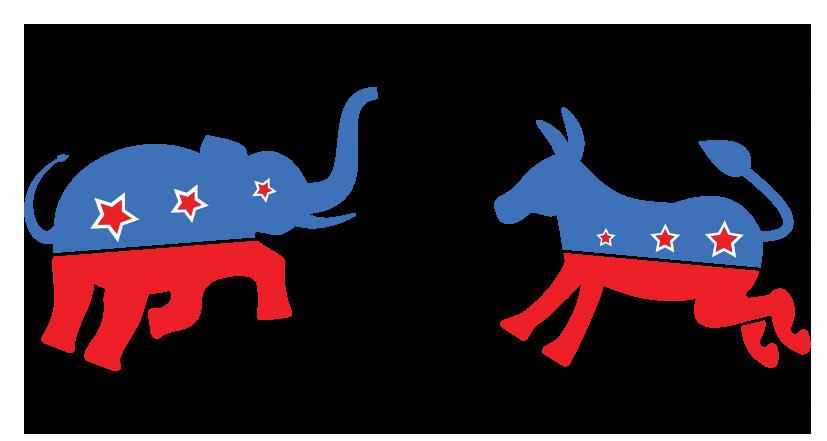
With this prevalence in community struggles including access to health care and social injustice, many of these concerns have been widely discussed in political debates for years. The abortion ban following the 2022 Dobbs v. Jackson Women’s Health Organization decision disregards the needs of vulnerable populations of women who sufer from issues including maternal mortality and sexual assault. The fght for abortion rights is central to women’s personal freedoms, and the government’s control over women’s bodies has even broader impacts. Harris acknowledges these abortion bans lack health risk exceptions. She is committed to reinstating Roe v. Wade protections, thus restoring legality and security for millions of women in the U.S.
While security applies to women’s healthcare, it also extends to gun reform. A key issue being debated is whether Congress should enforce gun reform, with questions raised about whether increased security measures, including increased police presence or stricter background checks, could reduce gun violence. During the Presidential Debate on Sept. 10, 2024, former President Trump alleged ice President Harris intended to confscate guns, which is not true. During a Unite for America 2024 television interview with Oprah Winfrey on Sept. 19, 2024, ice President Harris spoke about her gun ownership and how she is in favor of the Second Amendment. However, by supporting the Bipartisan Safer Communities Act, she shows her belief in the expansion of background checks and stronger criminal penalties for gun trafcking which demonstrates these measures are essential for making American societies safer. With these changes in ofce ice President Harris facilitated, it supports the notion that she does not believe in confscating guns but rather safer legislation to reduce gun violence.
Trump is the candidate that the United States needs due to his past record and campaign promises. He is the candidate that will secure the border and improve the economy. Let’s restore the U.S to what it is: the greatest country.
With Vice President Harris’ commitment to progressive stances, she positions herself as a leader who advocates for change that has yet to be implemented in the United States. Her alignment with the Democratic Party’s ideals of focusing on protecting individual rights and inclusivity shows her dedication to values of justice and equality relayed in the U.S Constitution. During this critical period in our nation, no other candidate shows more promise to lead the country forward than Vice President Kamala Harris.
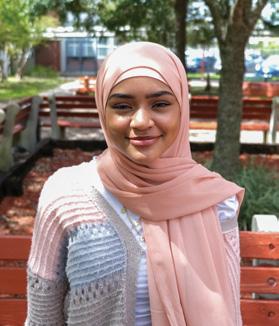
During the 2024 United States presidential election, candidates seek to convince voters to support them on their quest to assume the country’s highest political ofce. While most voters focus on the Democratic and Republican nominees, there
is a political category of candidates who are constantly overlooked: third-parties. A third-party candidate is a politician who runs in the election separate from the Democrats and Republicans. In the 2024 presidential race, one candidate particularly, Jill Stein, is breaking the stigma around voting third-party.
Even though these candidates are typically not projected to win elections, voting third-party is still
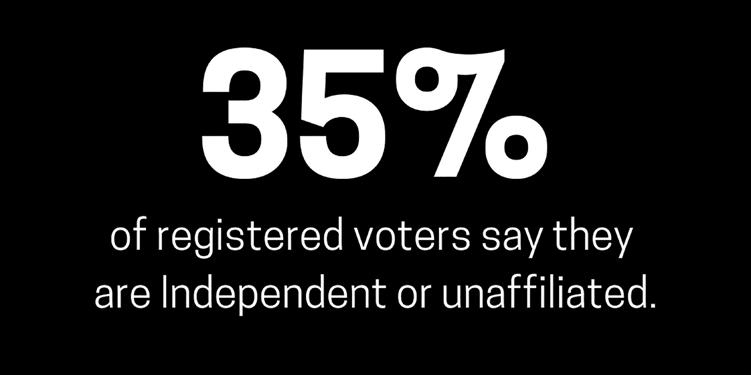
By HEBA AKHDAR, Staf riter
a vital option for citizens to express their beliefs. As the Green Party’s nominee, Jill Stein is the most credible contender aiming for the presidency. The Green Party was frst established in 1984, when separate states joined together to become one functioning political party with a strong focus on developing and supporting new eco-social policies. Additionally, The Green Party and Stein show concern for both American citizens and oppressed people abroad such as Ukrainians and Palestinians as they face severe conditions due to ongoing confict and increased hostilities.
Stein is unafraid to support unpopular movements such as advocating for a ceasefre in Gaza, which, according to The Hill, may have led to an increase in her poll numbers in this year’s election. The 2024 presidential election is not Stein’s frst time on the ballot; she also ran during the 2012 and 2016 elections. Although she did not win, she had a notable impact on the 2016 election, as votes that would have gone to then Democratic nominee Hillary Clinton went to her. oters dissatisfed with the Democratic and Republican parties took the initiative to vote for a candidate they agreed with and supported, leading to this increase in votes. These numbers assert her presence and infuence in presidential elections. Although some may be quick to count Stein out of contention, her impact
on the election should not be undermined. She could be the deciding factor on who obtains the presidency during this presidential race.
The policies and movements Stein promotes display her dedication to ensuring economic, political, and social equality for all. According to her campaign website, she plans to raise the minimum wage to $25 per hour, establish free graduate education, and create a free healthcare program for all American citizens. This would guarantee a better quality of life for American citizens that previous presidents and politicians were unable to secure. In addition, her campaign also focuses on establishing a “Green New Deal” which would address climate change and environmental concerns around the country. In this way, Stein considers the future of America and will leave a legacy of environmental awareness within the country.
Considering the signifcant improvements Stein could facilitate within the U.S., she should not be underestimated during the 2024 presidential election, especially since her domestic and foreign policies refect the concerns of the American people. Her platform centers around advocating for people of all nations, the planet, and peace. As the most progressive candidate, Stein can facilitate change and improvement within this country if given the chance.
By ADRIANA CHAKAROVA, Contributing riter

Despite the buzz of the 2024 election frequently dominating media focus, I personally fnd the event to be far from signifcant. As a hard-working high school student, my focus is on my main priorities and the events going on in my life right now. I often feel largely
separated from the political process and its topics due to my age. The common misinformation spread in the presidential political debates also furthers my overall apathy towards the election.
Ultimately, given this disconnect, it is no surprise some feel indiferent about the election. Like me, most high schoolers fall under the voting age limit. This means we have no infuence over which presidential candidate is elected, and subsequently little control over the future of America. Moreover, many policies fought over in the election are not directly impactful to those under the voting age. As a teenager, a great number of the main policies of the election do not directly impact me; for example, I do not own a home, deal with taxes, focus on retirement issues, or share many of the concerns
adults would have, which are prime focuses of the electoral debate. Therefore, it is not particularly relevant that Vice President Kamala Harris wants to raise taxes on corporations and the wealthy, according to Council Foreign Relations. Nor is it very relevant that former President Donald Trump advocates for tarifs, tax and government budget cuts. The truth is these main election issues just do not yet have much meaning for me and the general teenage population.
Not to mention, there is a growing sense of distrust in politician promises leading many people of all ages toward political apathy. If the candidates are able to spread misinformation and make false claims, how are we supposed to dedicate our full care and attention towards them and the election?
“They’re eating the dogs —the people that came in. They’re eating the cats,” is a popular claim made by Trump regarding Haitian immigrants in Springfeld, Ohio, that was quickly debunked by local ofcials. This misinformation likely stemmed from rightwing social media, according to Quaker Campus. Similarly, Harris recently faced some scrutiny for claiming there are no active United States duty troops in any combat zones. However, while it is
true they are not currently fghting, there are indeed still U.S. troops in federally designated combat zones. Take for example the 2,500 troops currently stationed in Iraq according to the U.S Department of Defense. These common inaccurate claims made in politics make me and others weary about fully trusting the election process. This common prevalence of misinformation drives me to largely disengage from the election process.
Despite my disconnect, it is still important to be prepared for the future, and to know elections have a signifcant impact on society. The ideas and policies debated now might not afect me at the present moment, but they likely will someday. However, the current focus of my life is in the now rather than in the later. Like many, I choose to focus on what I am doing presently, so that I can strive to put my all in everything, without getting distracted by distant concerns. While the election is important to many, and they have the right to think so, as of now I am largely disinterested in the whole process. I instead have a greater focus on what is right in front of me, which does not include the election.
